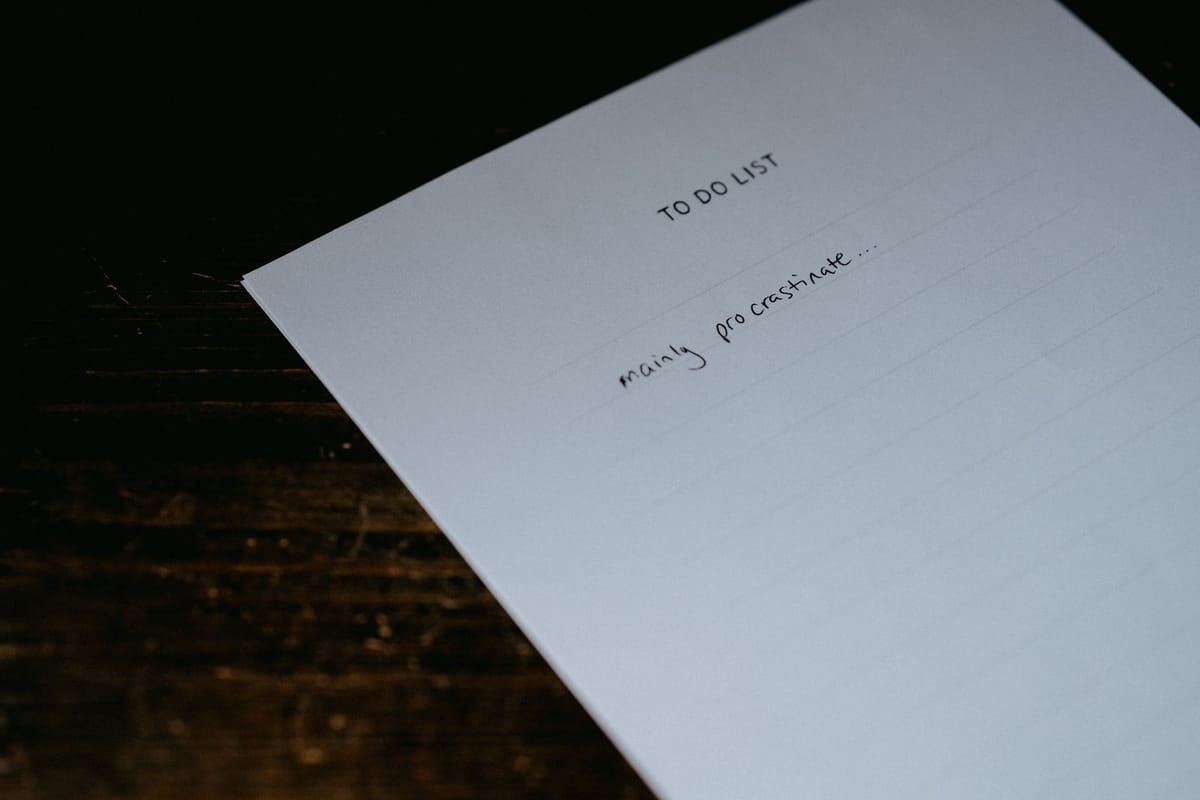The signs you're a serial procrastinator
We all know that person.

We all know that person.
The one who always says they'll do it tomorrow. The serial procrastinator. If you're afraid you might be one of them, don't worry—you're not alone! Most people put things off from time to time, but if you find yourself doing it all the time, you may be a serial procrastinator.
This week, we'll take a look at some of the signs that you may be a serial procrastinator, as well as some tips on how to overcome it.
Procrastination is a common behaviour that can have a negative impact on our lives
Procrastination is a common behaviour that can have a negative impact on our lives. It's frequently misinterpreted as a sign of laziness or a lack of discipline, but it's actually a symptom of something else.
Fear, perfectionism, or boredom can all lead to procrastination, which is frequently the result of our inner monologue.
We tell ourselves that we're not good enough, that we don't have the necessary skills or time. As a result, we put it off until later, when we hope to have all the answers magically. But this rarely occurs, and the tasks only grow larger and more difficult the longer we wait.
Stress and anxiety can also result from procrastination. We become overwhelmed by the task at hand, and we begin to worry about what will happen if we do not complete it on time. This can cause us to lose sleep, affecting our productivity and mental health, which in turn affects our productivity and our mental health.

There are different types of procrastinators, and each one has its own set of challenges
As a freelance graphic designer, I know that productivity is key to meeting deadlines and keeping clients happy. That's why I've learned how to manage my time effectively and overcome the common obstacles that come with being a serial procrastinator.
If you're someone who struggles with getting work done, here are a few signs that you might be a serial procrastinator:
- You're always putting things off until the last minute. This is the most common sign of a serial procrastinator. If you find yourself constantly putting things off until the last minute, it's time to reevaluate your priorities and learn how to better manage your time.
- You're always making excuses. Another telltale sign of a serial procrastinator is making excuses for why you can't get work done. Whether it's blaming others for not giving you enough time or coming up with reasons why something isn't urgent, these excuses are just a way of avoiding the work that needs to be done.
- You're constantly trying to find distractions. When you're avoiding work, it's easy to fall into the trap of looking for distractions. Whether it's scrolling through social media, watching TV, or talking on the phone, anything that takes your attention away from the task at hand is a form of procrastination.
- You're never happy with the results. If you find yourself never being satisfied with the results of your work, it's likely because you're a perfectionist. Perfectionism is often at the root of serial procrastination, as it's difficult to start something when you're worried about not doing it perfectly.
- You always feel overwhelmed. If you're constantly feeling overwhelmed by the amount of work you have to do, it's a sign that you need to learn how to better manage your time and priorities. Feeling overwhelmed is often what leads to procrastination in the first place, so it's important to find a way to break this cycle.
The good news is that there are ways to overcome serial procrastination and become more productive. By learning how to manage your time, set realistic goals, and overcome perfectionism, you can start getting work done and achieve the success you deserve.

The best way to overcome procrastination is to become aware of your tendencies and motivations
Procrastination can be a difficult habit to break, but it's important to understand why you're procrastinating in the first place. Are you putting off work because you don't know where to start? Or maybe you're waiting until the last minute because you enjoy the rush of adrenaline.
Whatever the case may be, the best way to overcome procrastination is to become aware of your tendencies and motivations.
If you can identify the root cause of your problem, you can take steps to address it. For example, if you're a perfectionist, try setting smaller goals so you don't feel overwhelmed. Or if you're someone who likes to procrastinate for the thrill of it, try setting a timer and working for a set amount of time.
Whatever strategy you select, keep in mind that breaking the habit of procrastination takes time and effort. Be patient and keep trying—eventually, you'll find what works best for you.
Sometimes, procrastination can be a good thing
While it's often seen as a negative habit, procrastination can actually be a positive force in your life. In some cases, it can lead to greater creativity and productivity.
For example, if you're working on a project that requires a lot of creative thinking, take some time to procrastinate. Allow your mind to wander away from your work. The break will help refresh your ideas and give you a new perspective on the task at hand.
Of course, there's a fine line between productive procrastination and simply putting off work. Make sure you're using your time wisely—if you find yourself wasting hours with no results, it's time to get back to work.

If you're doing everything in your power to avoid working on a project, it might be time to take a step back and reassess your priorities
If you find yourself continually putting off a task, it might be time to take a step back and reassess your priorities. Ask yourself why you're avoiding the task, and what you're hoping to gain by doing so.
Are you afraid of failing? Are you bored with the project? Do you feel like it's not worth your time? Once you've identified the source of your procrastination, you can begin to address it.
Freelance graphic designers often fall victim to procrastination because they want their work to be perfect
As mentioned before, freelance graphic designers often fall victim to procrastination because they want their work to be perfect. But this perfectionism can often lead to frustration and burnout.
If you find yourself in this circumstance, it's critical to stand back and reconsider your priorities. Ask yourself what's more important: achieving perfection or finishing the project. In most cases, it's better to finish the project and move on, even if it's not perfect.

Stress and anxiety can result from procrastination
Procrastination can lead to stress and anxiety because it's often accompanied by feelings of guilt, shame, and frustration. When you put off important tasks, you may feel like you're not good enough or that you're not living up to your potential. This can lead to a lot of stress and anxiety, which can interfere with your productivity and quality of life.
If you find yourself in this situation, it's critical to step back and reconsider your objectives. Consider which is more important: completing the task or maintaining your mental health. In most cases, taking a break and returning to the task when you're more relaxed and refreshed is preferable.

Procrastination can lead to missed opportunities
Procrastination can lead to missed opportunities because it causes you to miss deadlines, which can cost you jobs, promotions, and other opportunities. It can also cause you to miss out on experiences that could have been great for your personal growth.
Procrastination can damage your relationships
Procrastination can damage your relationships because it can make you seem unreliable, flaky, and irresponsible. This can strain your relationships and make it difficult to maintain healthy friendships and romantic partnerships.

Procrastination can be detrimental to our lives
As we have seen, procrastination can have a negative impact on our lives. It can cause stress and anxiety, make us feel overwhelmed, and reduce our productivity. But keep in mind that procrastination is a symptom of something else.
If you're constantly putting off a task, it's time to take a step back and rethink your priorities. Consider why you're avoiding the task and what you hope to gain by doing so. Once you've identified the source of your procrastination, you can begin to address it.
If you're not sure whether procrastination is helping or hurting your productivity, assess your habits and see how they're affecting your work. You can decide what is best for you once you have a better understanding of the pros and cons.
In the end, only you can decide if procrastination is a good or bad thing
Ultimately, whether or not procrastination is a good or bad thing depends on your own personal circumstances. If you're able to use it to your advantage, then it can be a helpful tool. But if it's holding you back from reaching your goals, then it's time to make a change.
In the end, only you can decide if procrastination is a good or bad thing. On the one hand, putting off work can lead to anxiety and stress. On the other hand, some people feel more productive when they work under pressure.
Discover what works best for you and stick with it. If you’re struggling with procrastination, try out some of the techniques I’ve suggested in this article. And above all else, be honest with yourself—know your tendencies and work towards changing them for the better.
In conclusion, procrastination can be both a good and a bad thing. It's often seen as a negative habit, but it can also be viewed as a sign of productivity. If you're doing everything in your power to avoid working on a project, it might be time to take a step back and reassess your priorities.
Have you ever struggled with procrastination? What were some of the reasons why? Let me know in the comments below!



